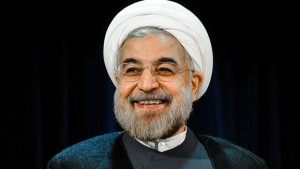 Rouhanis Problems with Food for Iranians
Rouhanis Problems with Food for IraniansIran has called for good intentions and good faith in talks, scheduled for February 18, on a comprehensive nuclear agreement.
Tehran and the 5+1 Powers (US, Britain, Germany, France, China, and Russia), who signed an interim deal in November, will meet in Vienna in the opening attempt to reach a full arrangement by January 2015.
The head of Irans Atomic Energy Organization, Ali Akbar Salehi, indicated on Monday that Tehran would return to enrichment of 20% uranium if the talks were not productive:
We hope that this time they really come with good intention and good faith. If theyre really coming with good faith and good intention, this is an opportunity that they can utilize. Otherwise Iran will pursue its natural course.
Under the interim accord, Iran has suspended enrichment of 20% uranium, converting its stock to fuel plates or diluting it to 5%. In return, the US and its partners have begun lifting some sanctions.
A comprehensive agreement would include arrangements for nuclear sites like the heavy-water reactor at Arak, detailed inspections of facilities and mines, and the removal of all sanctions.
Judiciary: Detained Opposition Leader Karroubi Must Pay for Cruel Deeds
Iran Prosecutor General Gholam Hossein Mohseni Ejei has said that opposition leader Mehdi Karroubi, despite being moved from a small apartment to his home last weekend, will remain under strict house arrest.
Maintaining that Karroubi has been treated with much mercy, Ejei said those involved in protests after the disputed 2009 President election had pleased the revolutions enemies: Its perpetrators must pay for their cruel deeds.
Karroubi and Mir Hossein Mousavi, both candidates in 2009, and Mousavis wife Zahra Rahnavard have been under house arrest since February 2011.
Ejei indicated they could be released if they confessed: Whoever has committed a crime and then repents and tries to make amends will of course be dealt with differently.
Judiciary Blocks UN Human Rights Investigator Again
Iran Prosecutor General Gholam Hossein Mohseni Ejei has again rejected entry by the United Special Rapporteur on Human Rights, Ahmed Shaheed, into the country.
Ejei said on Monday, For preparing his reports, this person goes to people who are against Islamic Republic and have declared war on the people of this country; were he impartial, he would not prepare his reports on this basis.
Ejei indicated Tehran would re-consider if Shaheed dropped his bias against Iran, If a rapporteur proves his impartiality, we will not have any problem with his/her visit to the country, as it has already been shown in similar cases.
Last month senior judiciary official Mohammad Javad Larijani said Shaheed, who was appointed in June 2011 but has never stepped foot inside Iran, supported terrorist groups extensively.
By Ea World View
The Iran Project is not responsible for the content of quoted articles.










